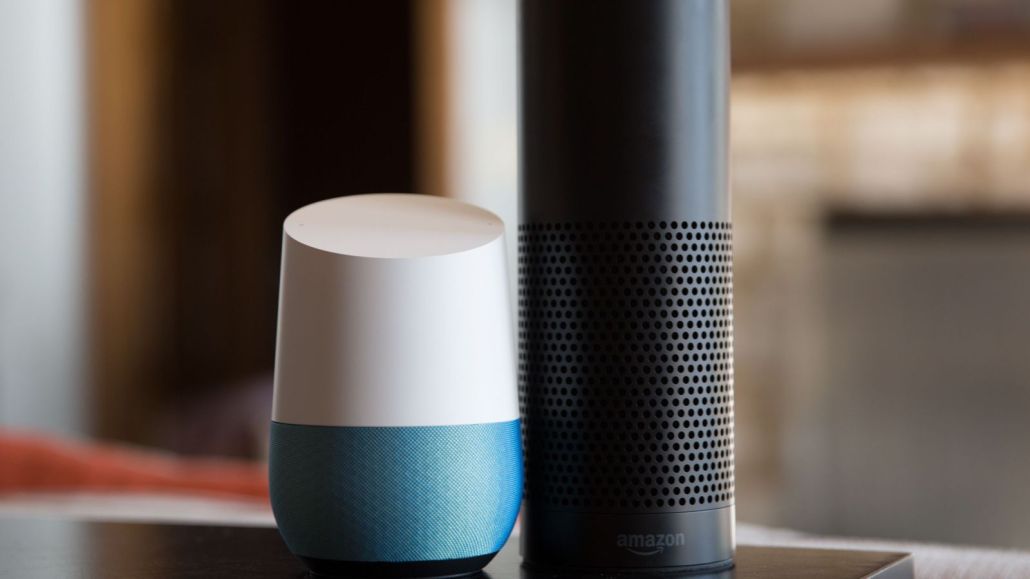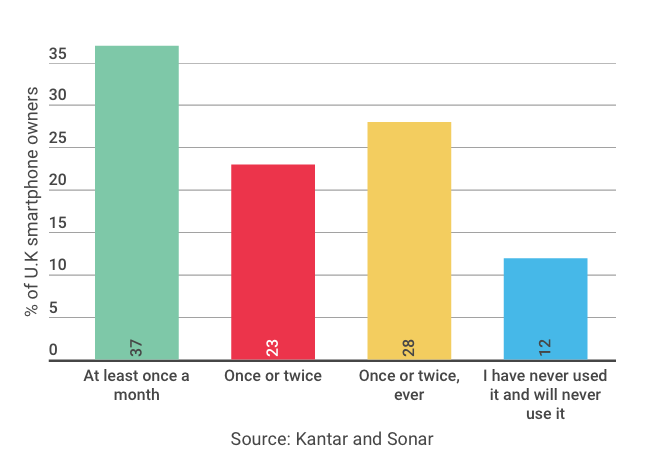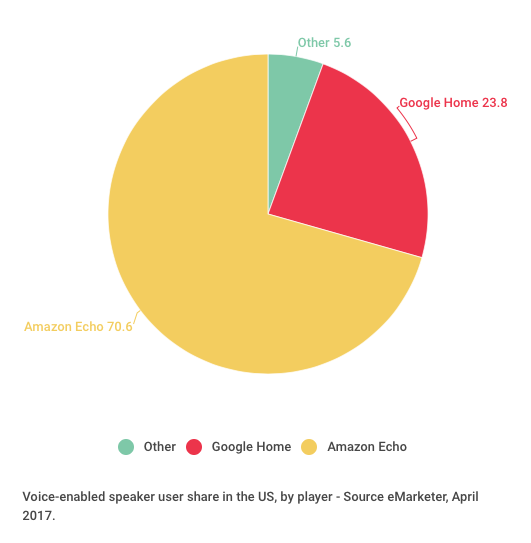
Brands are being told 2017 will be the year of voice search, but questions exist about whether it’s overhyped.
Google itself says it is still years away from being able to monetize voice searches in the same way it does search, apps, ads and online transactions. Consequently, it’s not spending much time at the moment thinking of a business model for it and advertisers to exploit the opportunity, said Jason Spero, Google’s vp of performance media.
“I think we have enough history from the apps world, the auctions world and the transactions [we do] that the combination of those will be the foundation of a business model for assistance when we get there,” he said.
Here’s a look at the state of voice search advertising, in three charts.
The future of paid voice search advertising
Part of the problem with Google selling voice search ads is that it saps user trust. If the only response to a Google Home query is a paid one, then why would a person trust the sponsored answer they receive? While it’s unlikely Google would find itself in as extreme a position with one of its advertisers, the scenario highlights how people can’t ignore voice ads in the same way they might overlook ads on a screen. And people don’t want to listen through ads to get answers to their questions.
That’s why most of Google’s early steps in ubiquitous voice searches focus on shaping the customer experience, said Spero. Most people Google surveyed earlier this year highlighted inherent shortcomings in the customer experiences around voice searches. More than five in 10 (57 percent) of the 3,000 surveyed would use voice search more if it recognized more complex commands, while 58 percent of respondents said they would like more detailed results when using search.
A separate JWT study of 1,000 smartphone users in the U.K, U.S., Germany and Spain backed these findings. JWT found that many potential voice search users cannot see the advantage it has over touch or type, with 29 percent of all non-voice users saying they “don’t see the point.” This rises considerably in some of the more skeptical markets such as the U.K. (48 percent) and Germany (39 percent).

Spero said there’s still work to be done before the industry can start professing the advent of voice search. Much of the work he and his team are doing to advance voice search focuses on understanding the global trends shaping how people feel about personal assistants.
For now, that means offering tasks like playing Spotify playlists through Google Home or ordering tickets to a basketball game as opposed to more complicated tasks and transactions, said Spero.
“We’re still literally in a greenfield trying to find the types of things people want from these devices,” he said. “The next 18 months is about figuring out how to tune the assistive experiences to understanding what not to do from a consumer experience.”
How will brands win in voice search advertising?
How much of that knowledge transfers over to marketers remains to be seen, given many are still playing catch-up to mobile marketing. In fact, more than a quarter (27 percent) of the 252 digital marketers at Fortune 500 brands surveyed by SEO outfit BrightEdge still believe mobile is the “next big thing.” However, 31 percent believe that voice search is the “next big thing.” Despite this anticipation, two-thirds of those marketers have no plans to prepare for voice search.

But some marketers, like Matalan’s head of e-commerce, Andrew Banks, are already thinking about what ad units might look like (and do) in a voice-driven world. Speaking at a conference in London on June 27, Banks said the future of search is “anything that has an emotional attachment.” He seemed to suggest that the interruptive model of paid advertising in its current guise would not translate easily to personal assistants, which means advertisers like Matalan will need to readjust their view of paid media.
“If you know that you want that dress and you’ve already tried it on or looked at it, then you can use voice search, but not for the majority of emotional purchases in the next few years,” Banks said. “This is different for a functional product, buying cat food or checking your bank balance. This is where voice search will really come into its own.”
It’s a point a recent Forrester report noted and used to predict the end of digital advertising “as we know it.” In the not-too-distant future, people won’t watch ads — they won’t notice them because of the web of targeting and personalization to drive sales and awareness, the report concluded.
Is Google at risk of losing its dominant position?
Some industry analysts have contemplated whether voice search is a risk to Google’s dominant position in digital media. Amazon’s Echo will be used by 70.6 percent of the 35.6 million Americans who use a voice-activated assistant device at least once a month this year, according to eMarketer, while Google Home trails with just 23.8 percent of the market. What’s more, the Echo defaults to Bing for any general search outside of one of the apps, leaving Google at a disadvantage, should it try to scale its fledgling voice search business.

Spero said it’s “unfounded and dramatically premature” to declare that voice assistants be the end of advertising as we know it. “There will still be people who are looking for restaurants and thinking about what car to buy or what to trip to go on,” he said. “All those people need help from marketers to figure that out, and I think the customer journey will remain the same in many ways with these assistive experiences [on top].”
More in Marketing

YouTube’s upmarket TV push still runs on mid-funnel DNA
YouTube is balancing wanting to be premium TV, the short-form powerhouse and a creator economy engine all at once.

Digiday ranks the best and worst Super Bowl 2026 ads
Now that the dust has settled, it’s time to reflect on the best and worst commercials from Super Bowl 2026.

In the age of AI content, The Super Bowl felt old-fashioned
The Super Bowl is one of the last places where brands are reminded that cultural likeness is easy but shared experience is earned.








